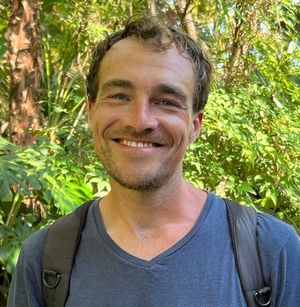Change characterizes every particle and process in the universe.
All motion is change, and the whole universe is in constant motion.
Without change, life itself would be impossible.
If an animal were lying still in front of people for long, the question would be asked “is it dead?” We expect living things to be moving and in-motion, and we use motion to gauge the liveliness of a thing. Our empathy toward plants is probably limited by their relative immobility, yet a few moments of stillness in the forest will awaken one to the immense and constant movement of the trees, the songs in their leaves, the singing of their inhabitants: the birds, the insects. The trees too are moving, and growing, just on a timescale that differs from ours, and is so missed by our human-calibrated perceptions.
At the cellular level, everything moves and changes, constantly. Under the microscope, the seemingly deadest of organisms come to life. Since our bodies are composites of these cells, which themselves are constantly in motion, and we see that we are usually in motion on the surface of this planet, which is itself in motion… — all the way up, all the way down, motion and change.
To tune into life means to tune into change: the pace of change, the characteristics of different patterns of change. Curiosity is wonder about change, to long for understanding about the processes and procedures of a Natural system, or a human-designed system, or how the human designed the system.
The more we investigate the nature of change, the more change we find. We find that change itself changes. In mathematics we learn formulae and graphs that represent changes of quantity, position, endurance, and so forth.
Explore enough topics deeply enough, and an embodied sense of complexity emerges, a true grasp of just how much is happening out there, beyond the control of “I”. In this complexity, it can seem as if there is nothing at all, at least nothing of meaning, within the control of “I” — just see how this chain of changes unfolds, toppling every life eventually in its path, giving no deference to the “I” that is there.
Self-consciousness is the specialized domain of knowledge that covers “all the changes I can influence.”
What it means to be self-conscious is to understand what changes the “I” that is you can influence.
When I was young, I learned that people’s emotions were changes I could influence. I saw that I could cause people to be happy or sad based on my words, or even my subtle behaviors. I understood that equally by omission as by act I affected others, and they affected me.
When I was an adolescent and young adult, I believed I had much more influence over a wider range of external events than I actually did. I reacted to this disillusioning by thinking the opposite: that I had no influence or possibility of influence at all.
My self-consciousness itself changed. It has become aware of its own changing nature, and how that changing nature affects everything around me, and beyond me. In reality I have both far more effect on the world than I realize, and far less. I have more in ways I do not see, and less in ways I think I do see. Like all types of knowledge, self-consciousness is limited by the limitations of the perceiver.
Unlike many other types of knowledge, however, we do not get to benefit from others’ perspectives as much. When observing physical phenomena, all of the individuals (subjects) may be different, and have different perceptions of an object, but at least there is the one object. We can repeat processes over and over in the physical realm and expect to get relatively consistent feedback from the experiments.
With humans, we have no such luck. Only I can perceive myself as a subject. Everything else is a model of me, made by another subject, analogizing (at best).
When I perceive you, as much as I may wish to perceive the subjective traits you possess from the inside, I will always still be perceiving you as an object, from the outside looking in.
As a result, the road of growing self-consciousness is inevitably a lonely one. The best help are the best analogies — the worst help, the worst ones. True empathy is knowing when to, and when not to project oneself onto others.
We all suffer pain, but we all process it differently. Some people perceive nearly all change as being painful at first, and then come to accept it. Others perceive most change as desirable, and then come to feel it as pain later.
How we process change is much of what we can call personality.
When we receive information from outside or inside ourselves saying “something has changed,” there is a feedback loop that gets us to practical action. That loop, first identified by military theorist John Boyd, consists of
- Observe
- Orient
- Decide
- Act
Sometimes, however, our desire for practical action is thwarted by our own internal, emotional response to change, notable usually most when it is negative. The negative emotional response to change is what we call “grief.”
Imagine what would happen to your life if every time you encountered a change, you went through all of the stages of grief:
- Denial
- Anger
- Bargaining
- Depression / Emptiness
- Acceptance
I would actually suggest that you do go through these stages every time you encounter a change that you find painful or judge as negative. You don’t notice it simply because you cycle through the stages pretty quickly in most instances.
Think of what happens when you stub your toe, or you catch your finger in a closing door.
No! (Denial)
F*ck whoever left that open! (Anger)
How could I have done that? / Next time somebody needs to…(Bargaining)
Aaaagghhh it hurts (Depression)
Life goes on…
The problem is that the grieving process jams the sensors that are trying to take practical action. If you get stuck in the grieving process, or can’t suspend it long enough to Observe, Orient, Decide, Act, you lose vital time and energy for nothing. You take no practical action, you achieve no tangible progress in life — and nothing to show for the time.
In your memories, you will only feel sorry for yourself, or be angry at yourself, but you’ll never look back on time spent in depression or with anxiety and say “ah, but I’m glad I went through that, that was good for me.”
This does not mean that a person can gain nothing from being depressed.
What I learned from my own depression, however, was, whatever the apparent cost, always choose joy. In some sense, this is life at peace with all of the changes of life, prospectively and retrospectively, without anxiety regarding the future, without regrets about anything from the past — flowing with the changes, without judgment, or without pretense that they can be directly controlled. Yet, willfully influenced to the extent possible, but not resisting in hope that resistance will achieve what one most wants, or wants to avoid.
It is impossible to do this flawlessly. It is impossible to keep it up all the time. Yet, this peace with change, is the only peace that can be made with life — precisely because life is change. Peace with others is also only achieved by being at peace with their changes, and requesting peace with one’s own.
T.S. Eliot, in his play The Cocktail Party, eloquently expresses this ancient thought about the inconstancy of our identities:
“We die to each other daily. What we know of other people is only our memory of the moments during which we knew them. And they have changed since then. To pretend that they and we are the same is a useful and convenient social convention which must sometimes be broken. We must also remember that at every meeting we are meeting a stranger.”
Much of the reason I encourage people to journal, and to write fully in first person in the present, in ink, is that as we record our honest thoughts today (to paraphrase Emerson), we can see how we have changed, and how we have remained constant, day after day, week after week, and so forth.
Our unchanging character, which speaks even above our actions, ought to evidence our virtues, and our constancy in them: confronting change with courage creates the “chain of victories behind” that Emerson says cumulatively adds up to the character of an individual.
The more chances we have to practice our virtues, the more they will outshine our vices.
Vices are maladaptive coping habits for responding to discomfort and change.
Whether those vices are chemical addictions, dietary bad habits, sexual compulsion, or whatever (and everybody has at least one), they will eventually have enough opportunity to debilitate us, if we have not spent the time to deprogram them, and give effort to strengthening the expression of our better natures.
The journal lays bare one’s habit, which is painful, but also its origin, which is helpful. What I have found when journaling is that my unhealthy behaviors were always rooted in a legitimate need being unmet somewhere in my life. Many times, the impulse toward those behaviors was curtailed by merely recognizing that it was rooted in that need, and then being able to take it into conscious control. This does not mean that needs can or should be left unmet indefinitely, but it means that we do not have to become the victims of our needs, and neither must we be controlled by them.
Morning journaling has the advantage of taking place when the mind is still slow, and desensitized to change, meaning we are the most sensitive to motion when we first wake up. I find I notice more changes within me, and in my external environment, even of my memories of the previous day, when I reflect on them in the calm of the morning.
For people with scurrying morning routines where everything is rushed, I can only say, make time in your morning to not be rushed, to not start your day reacting to change, but rather coolly observing it. Then, when the day is difficult, you will find yourself more consciously responsive to it, rather than unconsciously reactive.
This is the ultimate goal of regular journaling practice: to awaken awareness of change in the moment when it can still be changed for the better.
One of the paradoxes of modern life is that because of the nausea induced by all of the change and motion happening around us, is that we become completely numb to change, and thus feel constantly bored, and in boredom alone, and in bored loneliness, alienation.
Thus surrounded by dizzying change and motion, we are numb and alienated, our sensor-breakers overloaded and flipped off to prevent the whole apparatus from burning down.
The solution to this is actually to resensitize ourselves to change, to pick up on the most subtle of changes, appreciate it, engage with it in order to re-engage with the concept of change playfully. The best place for that is in nature, as far away from human noises as possible, where only the wind and the birds and the insects are perceptible.
There in what seems silence, the sounds of change will begin to surround — the birds, the crickets, the flies and the wasps. The wind in the trees.
The comfort is there, the comfort in change. Just be still, and you will feel it.








